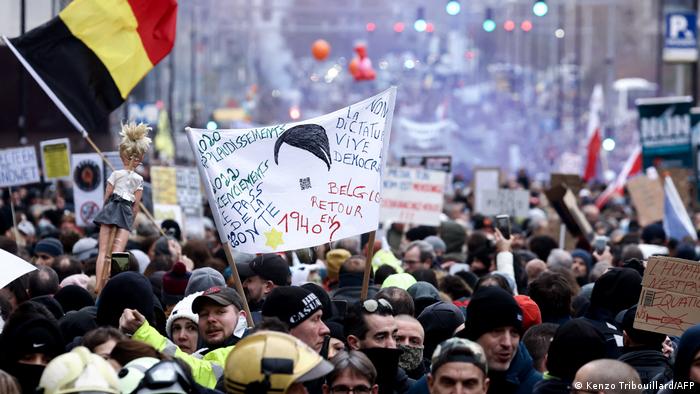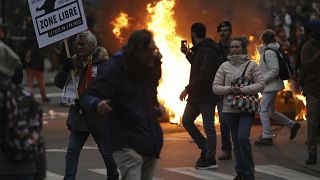
Euronews with AP, AFP • Updated: 24/01/2022

Protestors wave signs near a burning fire as they demonstrate against COVID-19 measures in Brussels, Sunday, Jan. 23, 2022. – Copyright Credit: AP
Belgian police fired water cannon and volleys of tear gas on Sunday in an attempt to disperse demonstrators in Brussels who gathered to protest against the government’s COVID-19 measures and virus vaccinations.
Several thousand protesters turned out, including some from other European countries, angry at the country’s health pass and other pandemic restrictions. Banners carried slogans critical of Prime Minister Alexander De Croo as well as the government’s measures.
The demonstrators — who the authorities said numbered around 50,000 — marched through the capital before gathering in Cinquantenaire Park in the city’s European quarter where they expressed their opposition to the government’s virus policies.
Riot police were out in force and eventually moved in to disperse the protesters, after they ignored instructions broadcast over loudspeakers that the demonstration was finished and that they should leave.
Police water cannon trucks fired powerful jets at the demonstrators, while thick clouds of smoke and snaking trails of tear gas filled the air.
The windows at the entry to the building of the European External Action Service were also smashed.
Sunday’s march followed demonstrations in other European capitals this weekend that also drew thousands of people protesting against vaccine mandates and other restrictions.
For several weeks now there have been protests — some also marred by violence — against Belgium’s health pass. This provides proof of vaccination or a recent COVID test in order to enter restaurants and cultural events in particular.
Earlier this month De Croo said it was important that the Belgian health pass — known as a “Covid Safe Ticket” — should remain a “temporary, exceptional measure”.
Conditions for obtaining the pass are to be tightened, although for now they remain less strict than in France. However, the Belgian parliament is due to debate turning the health pass into a “vaccine pass”, as has happened in the country’s western neighbour.
The organisers of Sunday’s rally, which included the movements World Wide Demonstration for Freedom et Europeans United for Freedom, had encouraged protesters from other countries to take part in Sunday’s demonstration. Dutch, Polish and Romanian flags were visible in the cortege.
“What’s happened since 2020 has enabled people to wake up,” said Francesca Fanara, who had come from Lille in northern France. Denouncing what he called a “health dictatorship,” Adolfo Barbosa from Portugal said it “warms the heart to see these people here”.
The rally came as some governments head towards a reduction of health restrictions, despite the persistence of the Omicron COVID-19 variant. The Omicron is now dominant in the European Union and the European Economic Area, the European Centre for Disease Prevention and Control (ECDC) said on Friday.
Belgium saw daily cases surge to above 60,000 last week, the authorities speaking of a “tsunami”. But Omicron’s effects, less severe than with the Delta variant, have enabled the health system to escape the pressure seen in previous waves.
Figures from Sciensano, Belgium’s public health scientific institute, showed that hospitalisations rose by 39% in the week to January 20 compared to the previous seven days, but the number of occupied intensive care beds fell by 10%. Some two-thirds of the adult population have received a booster vaccine dose.
Against this background, the prime minister said on Friday that restaurants and bars could extend their opening hours — although nightclubs have to remain closed.
In France, the government announced on Thursday that most pandemic restrictions will be lifted during February. These include compulsory mask-wearing outdoors in cities and home working. Nightclubs will be allowed to reopen and concert audiences will again be able to stand.